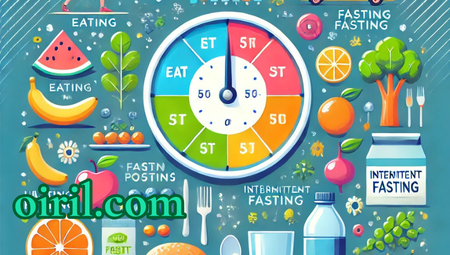In recent years, intermittent fasting (IF) has gained popularity as a powerful weight loss strategy. Unlike traditional diets that focus on what to eat, intermittent fasting emphasizes when to eat, allowing individuals to enjoy their favorite foods while promoting weight loss and overall health. This article will explore the principles of intermittent fasting, its various methods, health benefits, potential drawbacks, and practical tips for success.
What is Intermittent Fasting?
Intermittent fasting is an eating pattern that cycles between periods of eating and fasting. It is not about restricting calories but rather about timing your meals. During fasting periods, you either consume no calories or significantly reduce your caloric intake, while during eating windows, you eat normally, focusing on nutritious foods.
Types of Intermittent Fasting
There are several methods of intermittent fasting, each with its unique structure:
- The 16/8 Method: Also known as the Leangains protocol, this method involves fasting for 16 hours a day and eating during an 8-hour window. For example, you might eat between 12 PM and 8 PM and fast from 8 PM until noon the next day.
- The 5:2 Diet: This method allows you to eat normally for five days of the week while restricting caloric intake to about 500-600 calories on two non-consecutive days. For instance, you could eat normally from Monday to Friday and restrict calories on Tuesday and Thursday.
- Alternate-Day Fasting: As the name suggests, this approach involves alternating between fasting days and eating days. On fasting days, you can either eat very little (around 500 calories) or skip meals entirely.
- Warrior Diet: This method consists of undereating during the day (consuming small amounts of fruits and vegetables) and having one large meal at night, usually within a 4-hour eating window.
- Eat-Stop-Eat: This technique involves fasting for a full 24 hours once or twice a week. For example, if you finish dinner at 7 PM, you wouldn’t eat again until 7 PM the next day.
Why Intermittent Fasting Works for Weight Loss
Intermittent fasting can be effective for weight loss for several reasons:
- Caloric Restriction: By limiting the time frame in which you eat, many people naturally consume fewer calories, leading to weight loss.
- Increased Hormone Levels: Fasting triggers changes in hormone levels that facilitate weight loss. For instance, insulin levels decrease, promoting fat breakdown and allowing fat to be used as energy. Simultaneously, levels of growth hormone may increase, enhancing fat burning and muscle gain.
- Improved Metabolism: Some studies suggest that intermittent fasting can boost metabolism by increasing norepinephrine (noradrenaline) levels, which helps the body burn fat more effectively.
- Simplified Eating Patterns: Many people find that intermittent fasting simplifies their lives. With fewer meals to plan, prepare, and eat, it can be easier to stick to a healthy eating routine.
Health Benefits of Intermittent Fasting
Beyond weight loss, intermittent fasting offers several health benefits that can enhance overall well-being:
- Improved Insulin Sensitivity: Intermittent fasting may improve insulin sensitivity, which is crucial for blood sugar control. This is particularly beneficial for individuals at risk of type 2 diabetes.
- Enhanced Brain Function: Studies have shown that intermittent fasting can promote brain health by increasing the production of brain-derived neurotrophic factor (BDNF), a protein that supports neuron growth and function. It may also reduce the risk of neurodegenerative diseases like Alzheimer’s.
- Cellular Repair and Autophagy: Fasting triggers autophagy, a process where cells remove damaged components and recycle them. This cellular repair mechanism may reduce the risk of chronic diseases and promote longevity.
- Reduced Inflammation: Some research suggests that intermittent fasting can decrease inflammation markers in the body, contributing to a lower risk of chronic diseases such as heart disease, cancer, and arthritis.
- Heart Health: Intermittent fasting may improve heart health by reducing risk factors such as blood pressure, cholesterol levels, triglycerides, and inflammatory markers.
- Longevity: While more research is needed, some animal studies suggest that intermittent fasting may extend lifespan by promoting healthy aging and reducing the risk of age-related diseases.
Potential Drawbacks and Considerations
While intermittent fasting can be an effective weight loss strategy, it may not be suitable for everyone. Here are some potential drawbacks to consider:
- Hunger and Cravings: During the initial stages of intermittent fasting, individuals may experience increased hunger and cravings, which can be challenging to manage.
- Nutrient Deficiencies: If not planned properly, intermittent fasting could lead to inadequate nutrient intake. It’s essential to focus on nutrient-dense foods during eating windows to ensure you meet your dietary needs.
- Not Suitable for Everyone: Intermittent fasting may not be appropriate for individuals with certain health conditions, such as diabetes or eating disorders, or for pregnant or breastfeeding women. Consulting a healthcare professional before starting any fasting regimen is crucial.
- Potential for Overeating: Some individuals may overcompensate during eating windows by consuming unhealthy foods or larger portions, which can hinder weight loss efforts.
- Social and Lifestyle Factors: Fasting can interfere with social gatherings or events that revolve around food, making it challenging to maintain a social life.
Tips for Successful Intermittent Fasting
If you’re considering intermittent fasting as a weight loss strategy, here are some tips to help you succeed:
- Start Gradually: If you’re new to fasting, consider starting with shorter fasting periods, such as the 12/12 method (12 hours fasting and 12 hours eating) and gradually increase the fasting duration.
- Stay Hydrated: Drink plenty of water during fasting periods to stay hydrated and help manage hunger. Herbal teas and black coffee are also good options.
- Focus on Nutrient-Dense Foods: During eating windows, prioritize whole, nutrient-dense foods, including fruits, vegetables, lean proteins, whole grains, and healthy fats. This will help you feel satisfied and meet your nutritional needs.
- Listen to Your Body: Pay attention to how your body responds to fasting. If you feel fatigued, dizzy, or unwell, it may be a sign that fasting is not suitable for you.
- Plan Your Meals: Prepare meals in advance to ensure you have healthy options available during eating windows. Meal prepping can help you avoid unhealthy food choices driven by hunger.
- Incorporate Exercise: Combine intermittent fasting with regular physical activity for optimal results. Whether it’s strength training, cardio, or flexibility exercises, staying active will enhance weight loss and overall health.
- Be Consistent: Consistency is key to seeing results. Stick to your chosen fasting method and give your body time to adjust.
- Seek Support: If you’re struggling with fasting, consider joining a support group or seeking guidance from a nutritionist or healthcare professional.
Intermittent fasting is an effective and flexible weight loss strategy that emphasizes when you eat rather than what you eat. By cycling between eating and fasting periods, individuals can achieve their weight loss goals while enjoying their favorite foods. Beyond weight loss, intermittent fasting offers numerous health benefits, including improved insulin sensitivity, enhanced brain function, and reduced inflammation.
However, it’s essential to approach intermittent fasting mindfully and consider individual needs and circumstances. With the right strategies and support, intermittent fasting can be a sustainable and beneficial part of a healthy lifestyle.
Whether you’re looking to shed a few pounds or improve your overall health, intermittent fasting may be worth considering as part of your weight loss journey. Remember to listen to your body, plan your meals, and seek professional advice if needed. By adopting this approach, you can pave the way for a healthier and happier future.





